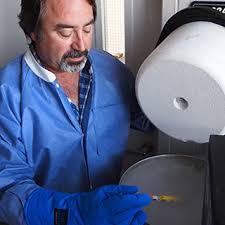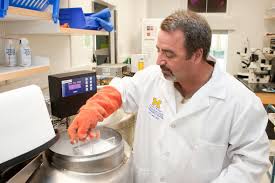Gary D. Smith, PhD
Director, MStem Cell Laboratories
Dr. Smith is a professor of obstetrics & gynecology, physiology and urology at the University of Michigan Medical School.
He has served as director of MStem Cell Laboratories since the lab was founded in 2011. Dr. Smith’s work on stem cells spans and links several areas, including:
- Political and public policy/public engagement involving human embryonic stem cells (hESCs)
- Derivation of disease-specific hESCs with national and international distribution
- Fostering cross-discipline collaborations using disease specific-hESCs to understand molecular mechanisms of congenital birth defects and adult diseases
- Practical solutions to enhance clinical utility of hESCs in drug testing and therapies
Dr. Smith participated in the drafting of Michigan Proposal 08-2, to amend the Michigan Constitution to remove restrictions on embryonic stem cell research. The proposal was passed by voters in the state on November 4, 2008 by a 53 – 47 margin, launching the opportunity to derive new hESCs in the state of Michigan.
From 2009 to present, Dr. Smith has worked diligently with the Michigan Department of Community Health and the University of Michigan’s Office of Government Relations in designing and implementing statewide reporting of human embryo research in relation to hESC production. Dr. Smith has been passionate and successful in disseminating information on stem cell research to healthcare professionals, scientists, political representatives, and the general public.
With passage of Michigan Proposal 08-2 Dr. Smith established the State’s first hESC derivation laboratory, now called MStem Cell Laboratories. His focus was to integrate 20 years of human embryology/in vitro fertilization (IVF) clinical laboratory knowledge, practical expertise, and quality management practices to improve the efficiency of hESC derivation.
In a few short years, the University of Michigan’s MStem Cell Laboratories has become the leading U.S. academic institution in derivation of disease-specific hESCs with acceptance on the NIH Stem Cell registry. To name a few, Dr. Smith’s laboratory has produced disease-specific hESC lines with genetic abnormalities that cause Huntington’s disease, Hypertrophic Cardiomyopathy, Adrenoleukodystrophy, Fragile-X, and Spinocerebellar Ataxia.
Many of these disease-specific hESC lines are unique worldwide and hold great promise as human cell models for understanding developmental mechanisms of disease establishment and progression. These disease specific-hESC lines also allow novel means of screening new therapeutics and repurposed drugs for disease treatment.
Being on the NIH Stem Cell registry is critical. While Dr. Smith’s derivation research cannot be federally funded (instead requiring University, private foundation, and philanthropist funding), the resulting hESC lines produced and accepted on the NIH registry can be used as research models by investigators across the U.S., and can be studied using federal funds. For this reason, MStem Cell hESC lines are in high demand.
Dr. Smith has established strategic University of Michigan cross-discipline collaborations to study neurodegenerative diseases, muscular dystrophies and cardiomyopathies. Such collaborations will facilitate and hasten discoveries and lead to treatments and cures in the near future.
In collaboration with laboratories in Biomedical Engineering and Chemical Engineering, Dr. Smith’s laboratory investigates the importance of hESC derivation and growth environment on subsequent cell function and clinical utility.
Dr. Smith earned his Master of Science degree from Oregon State University, and received his doctoral degree from Washington State University. He served a post-doctoral fellowship at Oregon Regional Primate Research Center.


